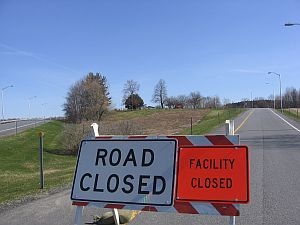
(Host) Four of Vermont’s 19 interstate rest areas have been closed as a result of budget cuts, but there’s some interest in reopening them if they can pay for themselves. One idea is to allow private businesses to operate the rest areas.
As VPR’s Steve Zind reports, there are arguments for and against the idea.
(Zind) Howard Emerson drives a truck up and down Interstate 89 in Vermont twice a week. Along the way, he passes two of the recently closed rest areas. During a quick break for coffee at the still-open Randolph southbound area, Emerson shrugs when asked if the closings have bothered him.
(Emerson) "I’m not missing it, but I think the people that are traveling the state are going to miss it. How are they going to use the restrooms? How are they going to rest anywhere? How are they going to get snacks or anything else? Especially the people with young kids."
(Zind) Gerry Myers is Commissioner of Buildings and General Services and he’s the one who recommended that the rest areas be closed.
(Myers) "We were more or less prepared for this, if you wish, onslaught of public opinion being voiced."
(Zind) Myers says hasn’t been overwhelming negative reaction to the decision.
The shuttered rest areas are in Highgate, Randolph, Sharon and Hartford.
Castleton representative Bob Helm says the areas provide more than just restrooms and coffee. Helm says literature and information available at rest stops helps point travelers to area attractions.
(Helm) "So the more we discontinue and close, the less of that we’re doing for our local businesses."
(Zind) Operating rest areas isn’t cheap. The state spent about four and a half million dollars on them last year. The four closings will save nearly a million dollars.
Lawmakers generally agree that the state can’t afford to keep them open, but some want to look for alternatives to closing them.
(Minter) "People ask me all the time, ‘why not make money there?’"
(Zind) Waterbury Representative Sue Minter wants the state to consider allowing private businesses to operate at the rest areas to actually generate revenue for the state.
In order to do that, Vermont would need a waiver from the federal government. Private commerce at Interstate rest areas is prohibited except in cases where a long-existing business has been grandfathered in or on toll roads.
(Minter) "We think its time the federal government lets us do some commerce in these buildings so that we can keep them open."
(Zind) A provision in the House Transportation Bill calls for Vermont’s congressional delegation to pursue a waiver.
Minter says she doesn’t envision chain fast food restaurants and out of state firms along Vermont’s Interstates.
(Minter) "I think we would do this in a Vermont way. We’d try to sell Vermont products. We’d try to sell Vermont foods. We’d try to sell Vermont locations."
(Zind) Buildings Commissioner Myers says he has some concerns about allowing private businesses to operate at rest areas. The biggest, he says, is that it might create competition for businesses that are dependent on traffic coming off the interstate exits.
(Myers) "I think that would be the biggest outcry if we chose certain places that we would commercialize, I can not think of a one that we wouldn’t have private business at nearby Interstate exits that would not come out of the woodwork to fight that process."
(Zind) Myers says he doesn’t know if more rest areas will have to be closed – it will be a decision driven by future budgets.
Myers says there are actually tentative plans to reopen one of the now shuttered areas. The rest stop on I-91 South in Hartford could be rebuilt in a few years. If it is, it’ll be nothing fancy. Myer’s says its likely the days are gone when the state builds big showplace rest areas, like those in Williston.
For VPR news, I’m Steve Zind.